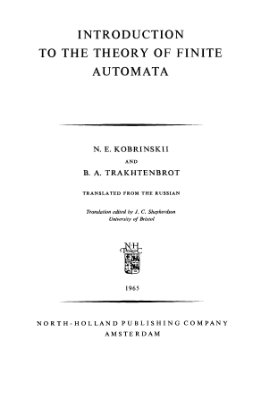Издательство North Holland, 1963, -342 pp.
In recent years, intensive work has been in progress at a number of centres to develop and apply various automatic digital systems for information processing. Such systems form the basis of digital computers, various control devices operating to a specified algorithm, and of models which simulate the activity of a living organism (termed robots). These automata take the form of independent special-purpose devices, or of sub-assemblies of which regulation and control systems are composed, and they are constructed from different components such as electro-mechanical relays, electronic \alves, transistors, ferrites etc. The production of various types of digital automata is increasing at a rapid rate. Their field of application is continually expanding. Meanwhile it has become extremely important to develop a theory of digital systems.
The theory of digital systems covers a wide range of problems connected with investigating the possibility of automating particular means of information processing, with improving the productivity and reliability of automata and with developing effective methods of analysing and synthe- sising them. Close attention is now being paid to these problems, both in the Soviet Union and abroad. In this connection the Soviet and foreign periodical literature published a large number of articles on different aspects of automata theory. However, the number of monographic studies in this field of investigation remains extremely small. At the same time, the need for literature to inform a wide readership of the present state of the theory of digital automata is continually growing.
The above reasons have impelled the authors to attempt a systematic exposition of the basic problems in the theory of what are known as finite automata and to demarcate accurately the various aspects of this theory.
Introduction
The Elements of Logic
Operators, Logical Nets
Operators of Physical Elements
Analysis of Automata
Methods of Specifying Operators
Practical Methods of Synthesizing Automata
Asymptotic Estimation for the Complexity of Logical Nets
In recent years, intensive work has been in progress at a number of centres to develop and apply various automatic digital systems for information processing. Such systems form the basis of digital computers, various control devices operating to a specified algorithm, and of models which simulate the activity of a living organism (termed robots). These automata take the form of independent special-purpose devices, or of sub-assemblies of which regulation and control systems are composed, and they are constructed from different components such as electro-mechanical relays, electronic \alves, transistors, ferrites etc. The production of various types of digital automata is increasing at a rapid rate. Their field of application is continually expanding. Meanwhile it has become extremely important to develop a theory of digital systems.
The theory of digital systems covers a wide range of problems connected with investigating the possibility of automating particular means of information processing, with improving the productivity and reliability of automata and with developing effective methods of analysing and synthe- sising them. Close attention is now being paid to these problems, both in the Soviet Union and abroad. In this connection the Soviet and foreign periodical literature published a large number of articles on different aspects of automata theory. However, the number of monographic studies in this field of investigation remains extremely small. At the same time, the need for literature to inform a wide readership of the present state of the theory of digital automata is continually growing.
The above reasons have impelled the authors to attempt a systematic exposition of the basic problems in the theory of what are known as finite automata and to demarcate accurately the various aspects of this theory.
Introduction
The Elements of Logic
Operators, Logical Nets
Operators of Physical Elements
Analysis of Automata
Methods of Specifying Operators
Practical Methods of Synthesizing Automata
Asymptotic Estimation for the Complexity of Logical Nets

